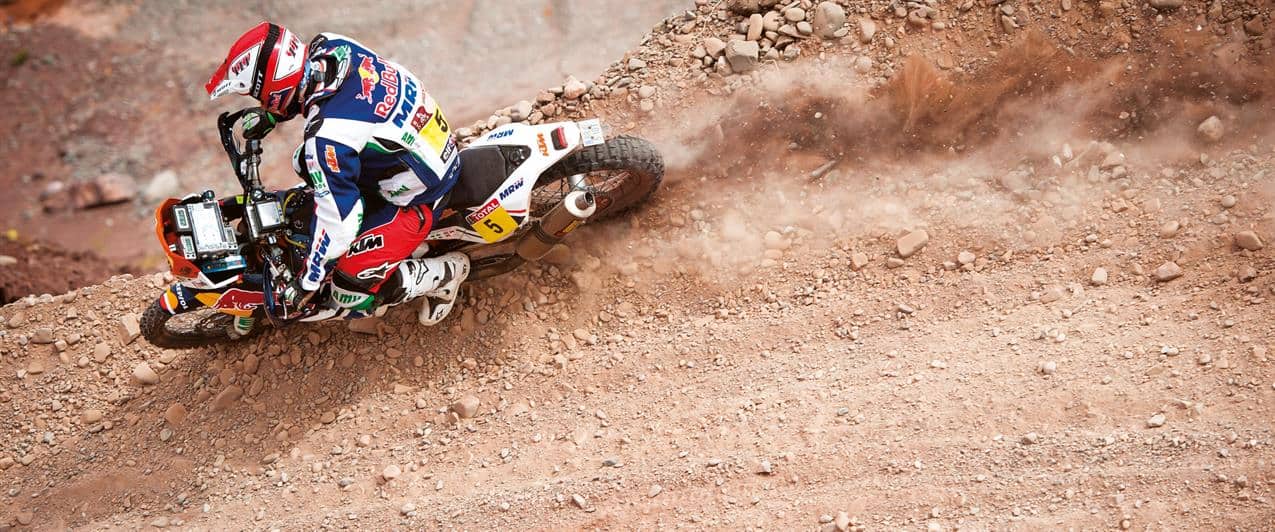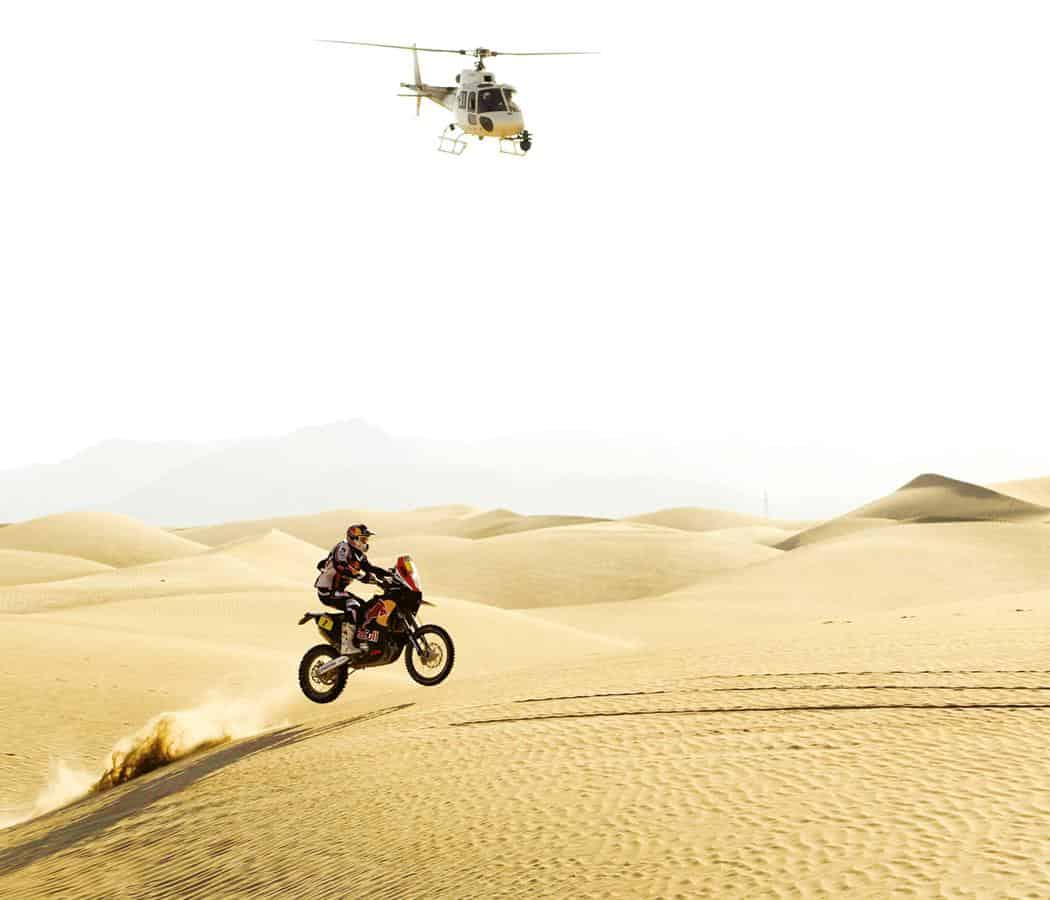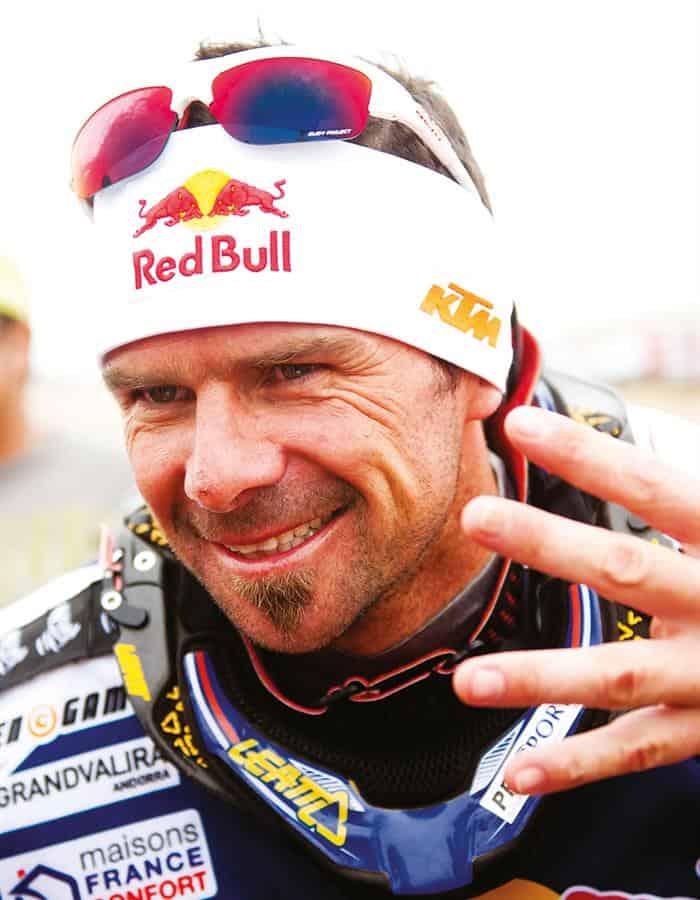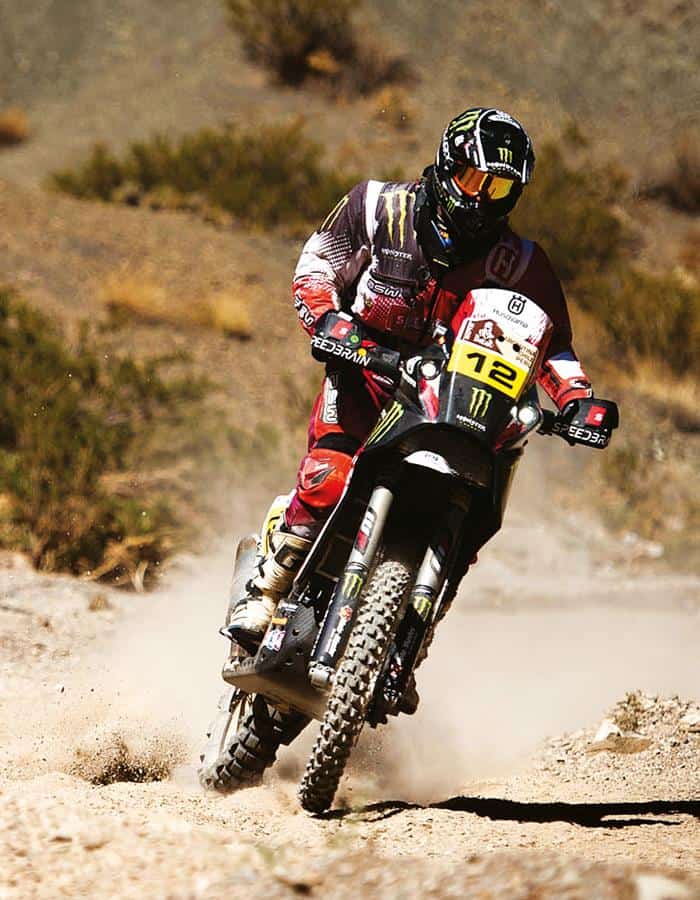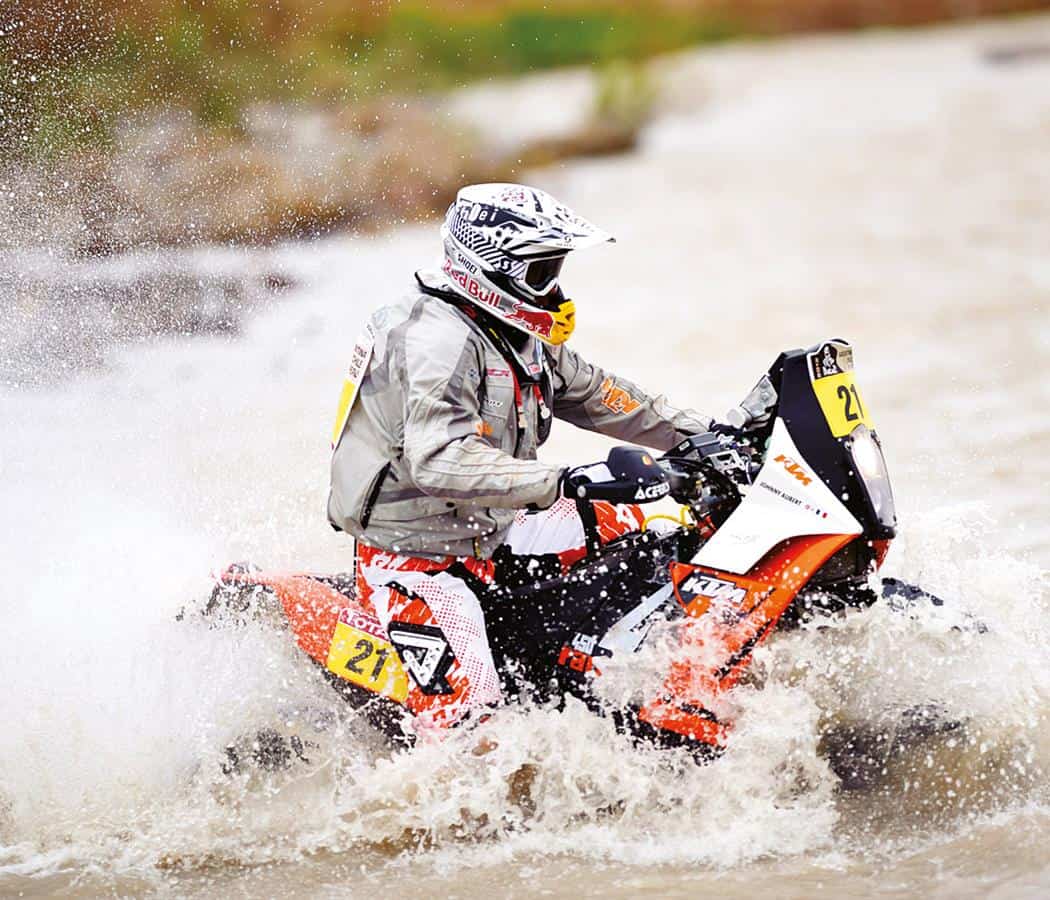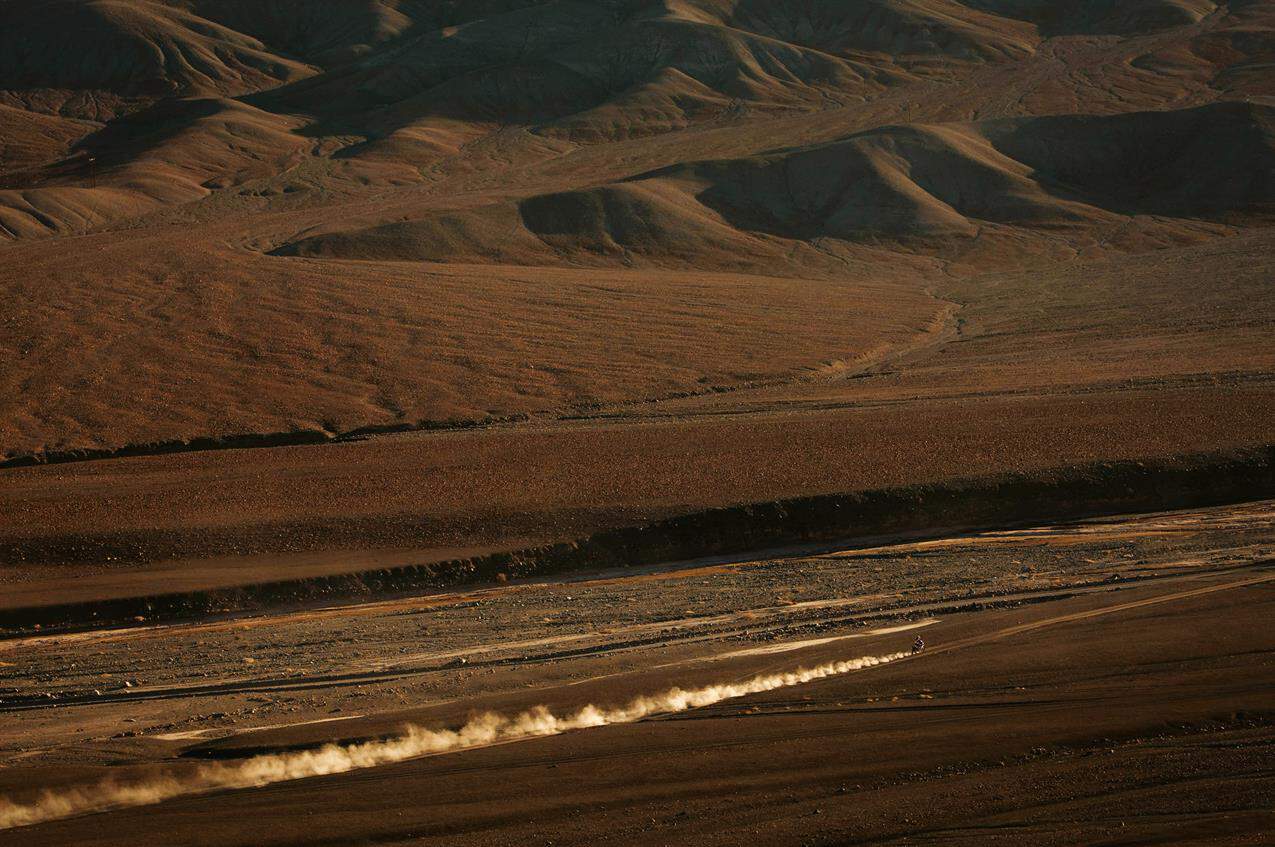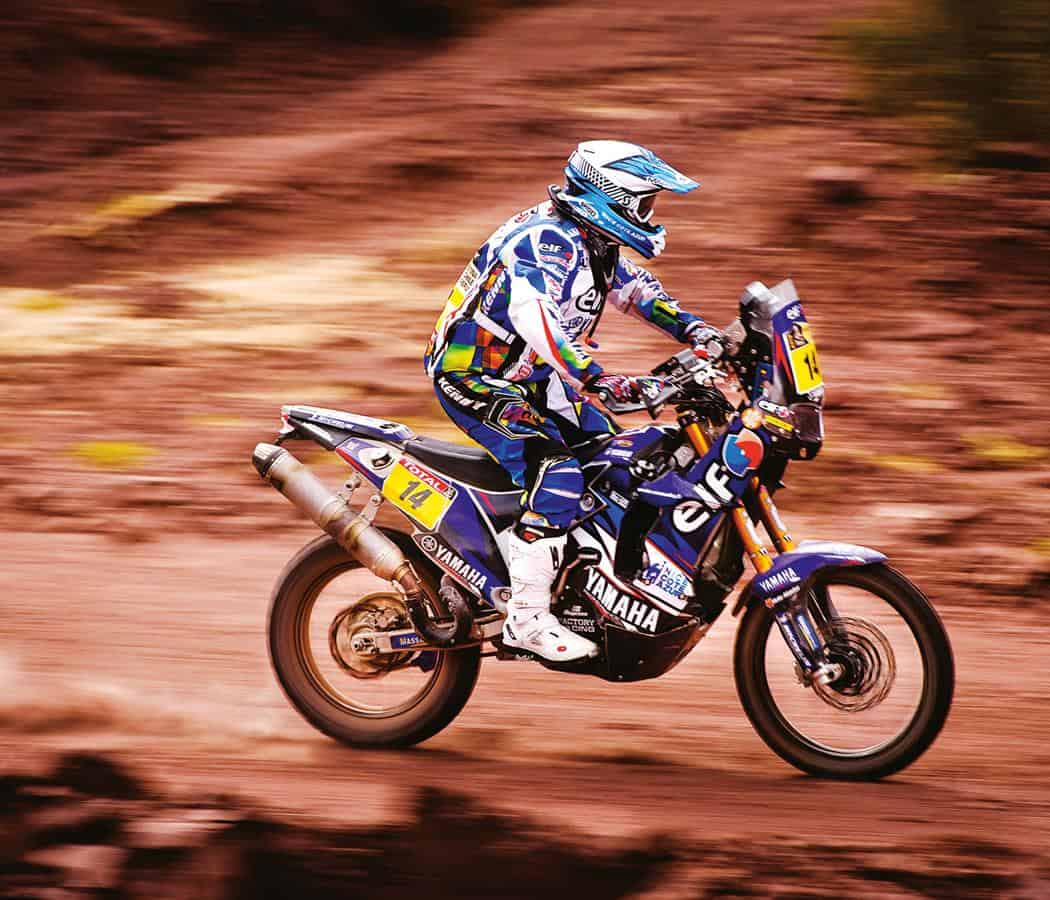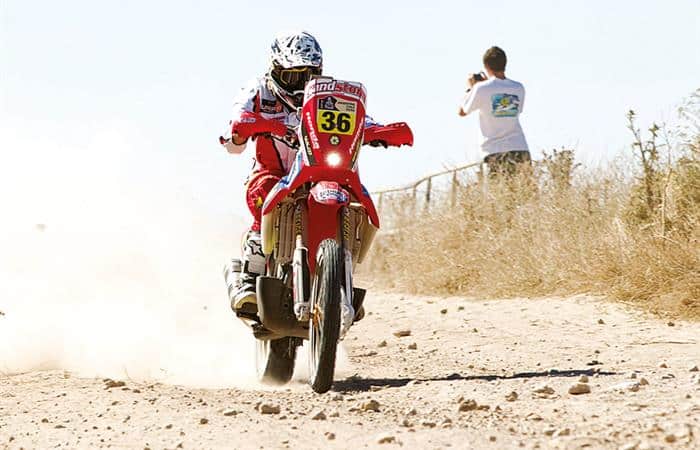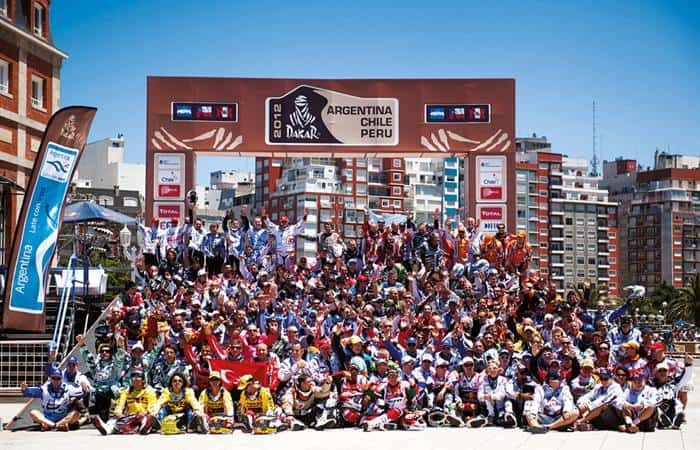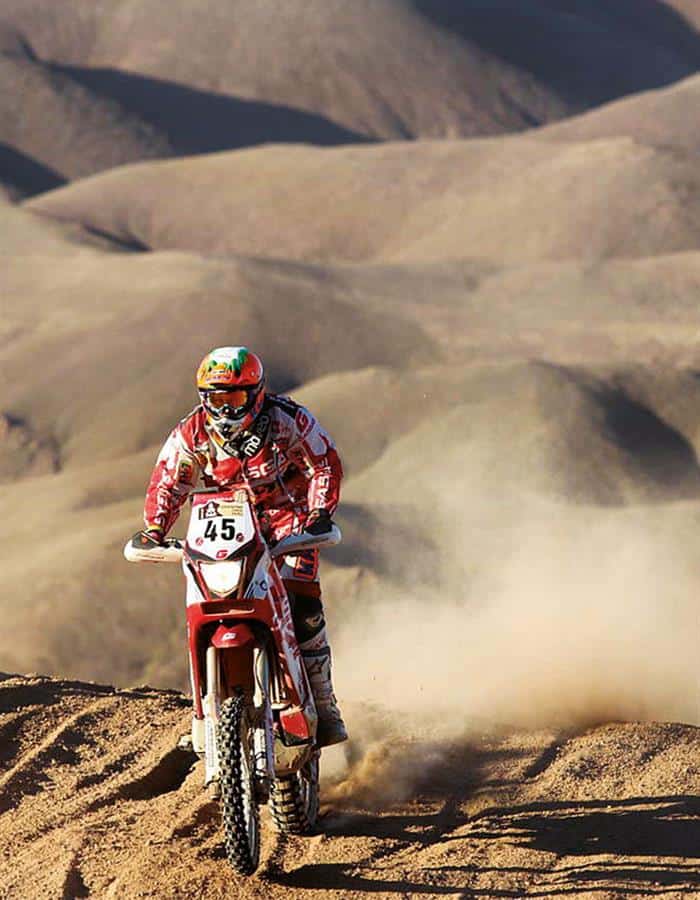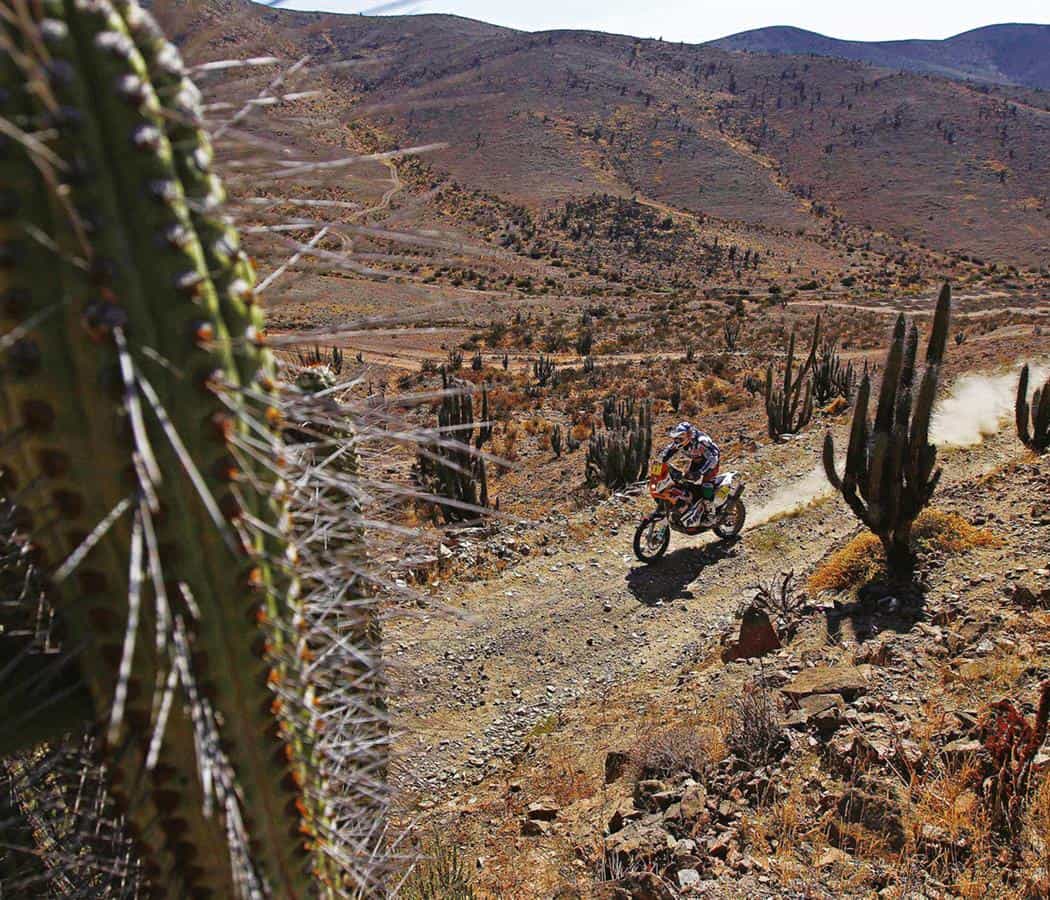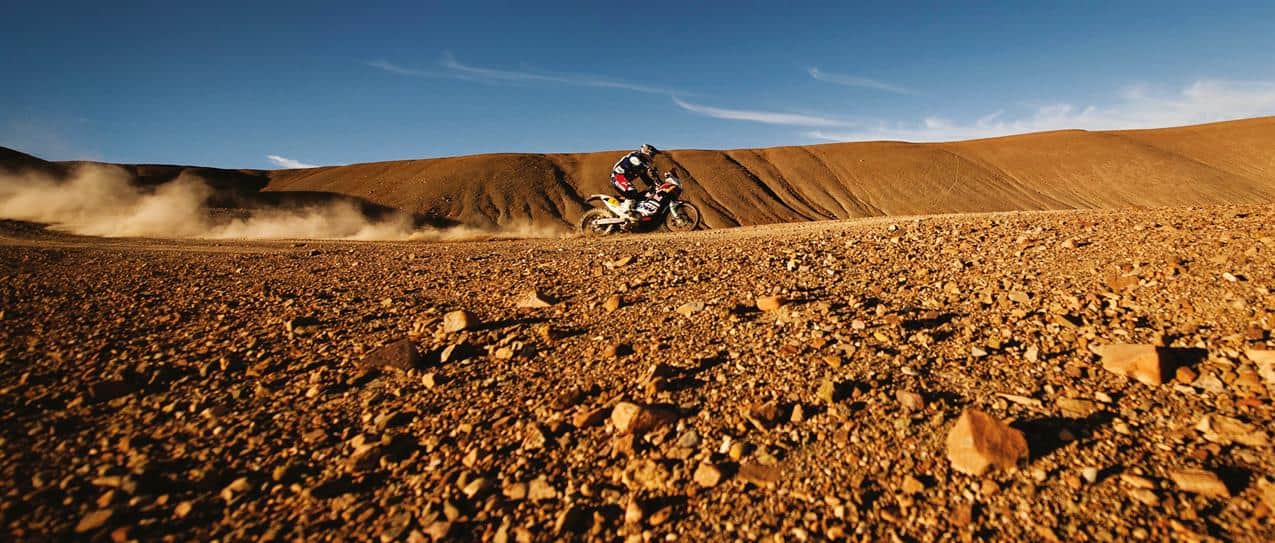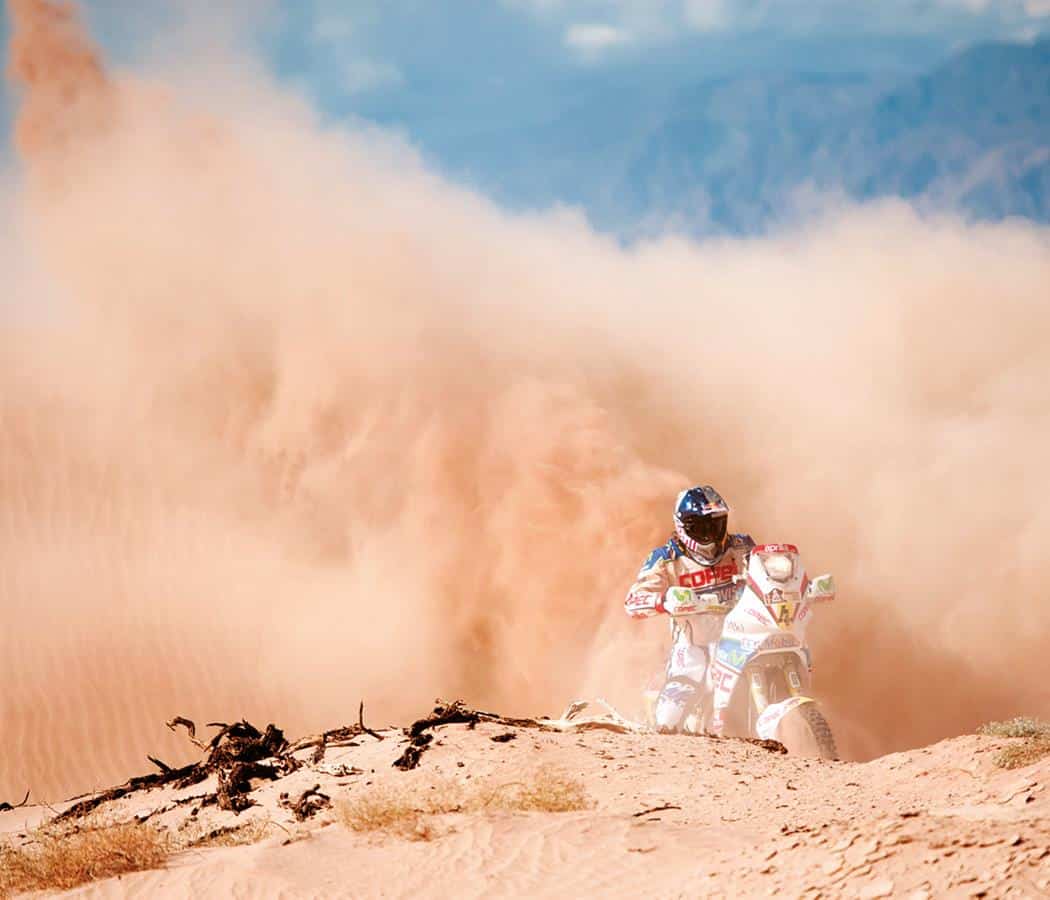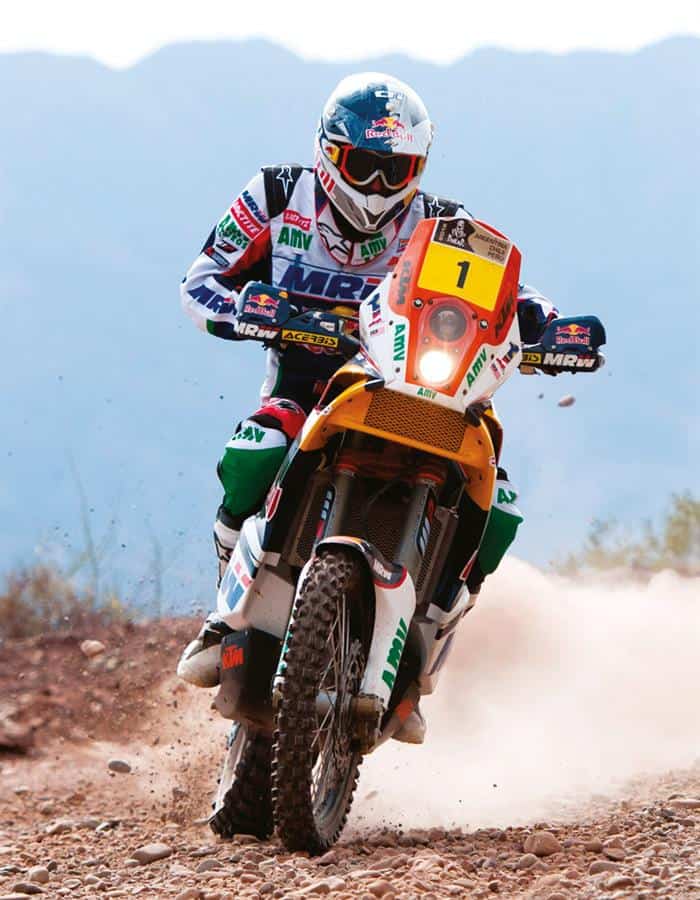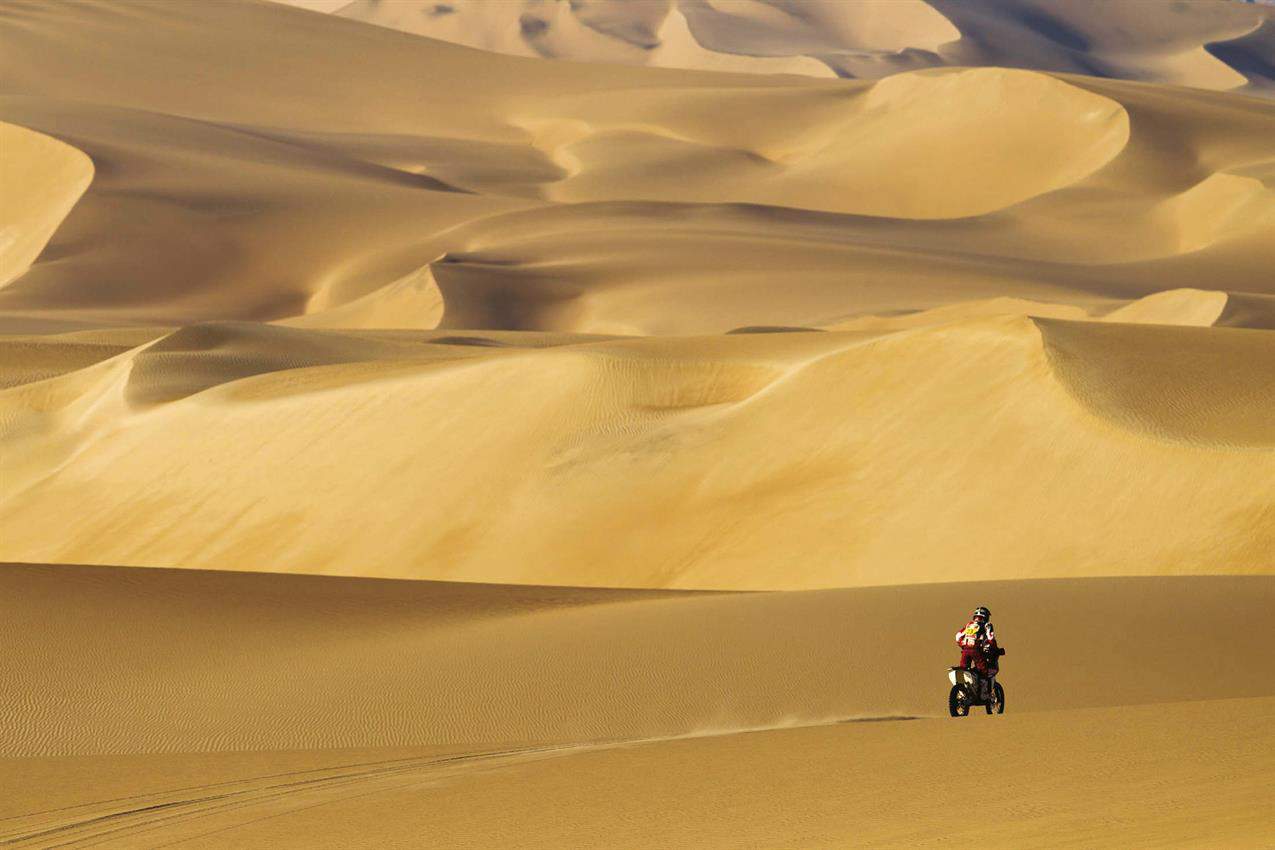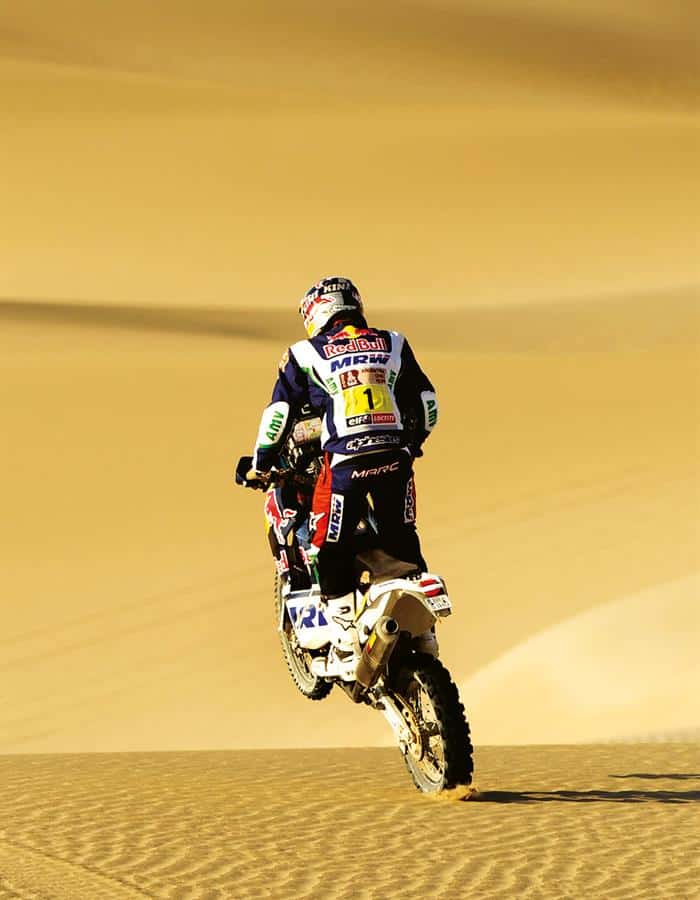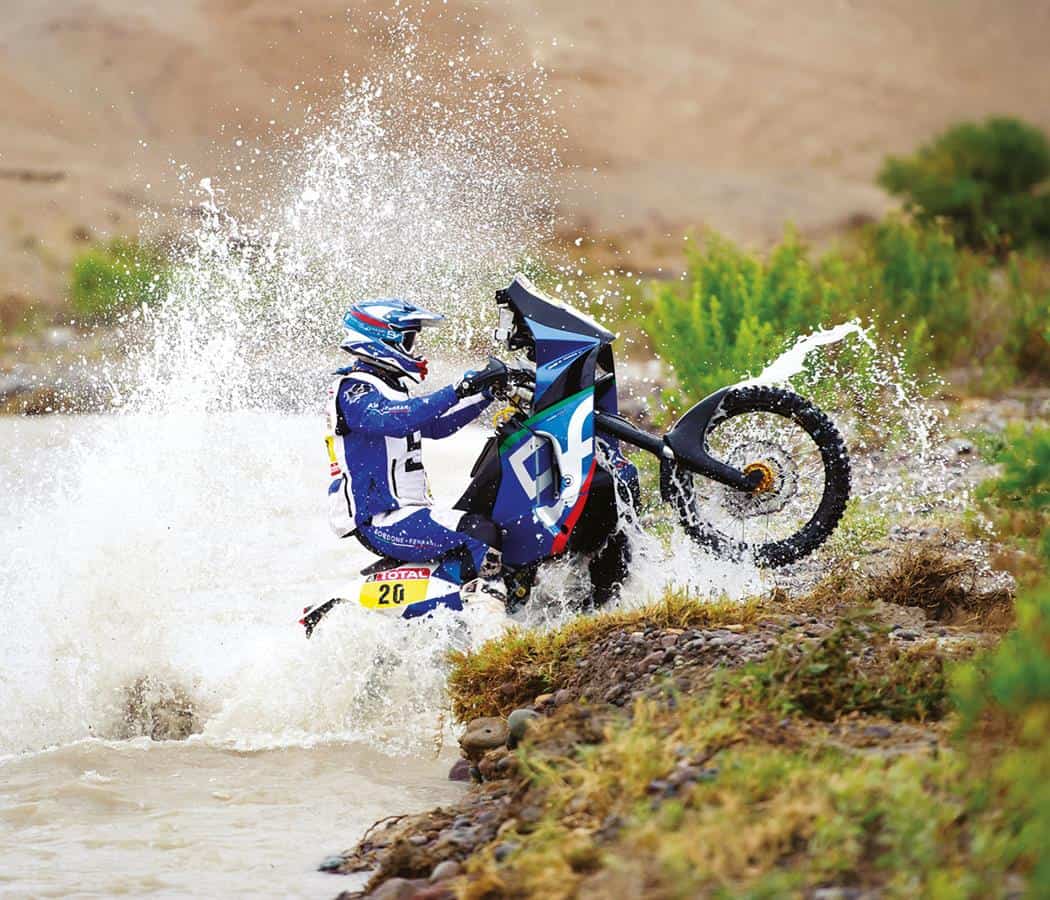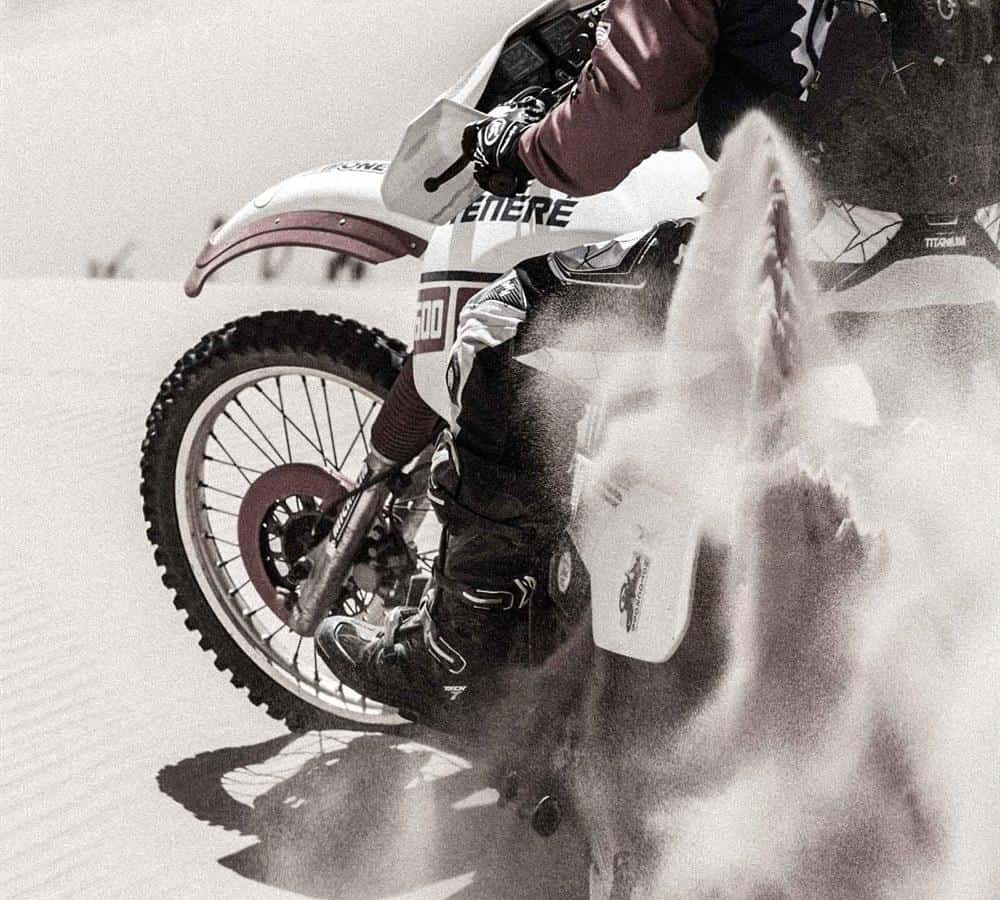The 2012 Dakar was won by a Frenchman – Cyril Despres – but he couldn’t have done it without the help of diminutive RUST columnist Chris Evans…
Obviously I’m delighted with how things turned out. After almost a year of preparation and sacrifice, to have succeeded in my goal is a source of immense personal satisfaction. The explosion of joy on the podium, the release of tension was just unbelievable. Yessss, for the first time ever, after 16 participations, I finally managed a whole Dakar without taking so much as a drag on a cigarette. Oh, and the rider I was working for took his fourth victory as well.
Okay, sorry about that, just a slightly flippant way of saying; ‘if you were looking for a totally unbiased, independent Dakar story, look elsewhere’. On the up side, this is the only account you will read in a UK publication written by somebody who was actually there, was working for the winning team and rider, and who vaguely understands what happened.
Now, unless you’ve being living under a sand dune for the last seven years, you will know that over that period, Dakar victories have been shared between KTM’s two factory riders, Spaniard Marc Coma and Frenchman Cyril Despres. Nobody else has had so much as a look in. They are the Nadal and Federer of desert racing (only their rallies are much longer!).
Now this stranglehold has created a certain number of tensions, not least within the winning team itself. Various solutions have been tried over the years to diffuse the situation between them, but none of them has been wholly successful. For the two previous editions Marc and Cyril ran separate teams using KTM technical support, but it was a lot of extra work, cost loads more money and made KTM nervous. And it lead to ‘Tyregate’ in 2010, where Marc received a six-hour penalty for illegally changing a wheel during a neutralisation and then, last year, to ‘Glovegate’ when Cyril got ten minutes penalty for going out the side of a control zone at the start of the liaison from the bivouac. Both incidents effectively cost the ‘victim’ the victory.
Following a meeting with KTM competition manager Pit Bierer in mid-2011 the two riders agreed to shake hands and bury the hatchet. It was decided that their bikes and those of their support riders would be serviced out of the same factory truck, while they would each have a motorhome (allowed on the Dakar for the first time in 2012) and someone paid by them to look after their various needs. Marc chose ex-rider Jordi Duran, who’d been his team manager throughout 2011, and Cyril choose little old me.
Incredibly, in a sport with so many imponderables, there was never any doubt that either Marc or Cyril would take the win. The big question was would Marc manage to put together a consecutive Dakar victory – the ultimate proof of superiority.
Things started off calmly enough at the seaside resort of Mar del Plata where the team spent four days getting used to the time difference and the intense heat. Once underway, relations remained cordial, if a little guarded, until the first of the three pivotal moments of the race, when Marc turned left and followed the car route on stage three. In total he lost about 13 minutes and in the process handed Cyril a 10m12s overall lead.
The contributing factor to Marc’s mistake, and there’s always at least one on a race as complicated as the Dakar, was that the Check Point (CP) that was intended to mark where the cars and bikes separated had to be cancelled when the controllers were unable to get to the location. The riders were informed of the problem at the start of the special but some journalists reported that Marc remained unaware of the cancellation. As far as I am aware Marc himself made no appeal, but the story and the fact that Cyril now had a small lead inevitably saw tension levels go up a notch.
The next big upset was ‘Mudgate’, when 10km into the first special after the rest day, Cyril rode into a huge mudhole and went straight over the bars. In the TV images it looks like he is stuck in a huge bowl of chocolate spread and that alone he is incapable of pulling the bike out. In the next scene you see he has enlisted the help of Paulo Gonclaves. And then in the final sequence you witness Cyril riding off and Paulo being left alone to extract his own bike.
While perhaps not Cyril’s finest hour, in his defence there are a couple of details that should not be overlooked. The first is that Paulo’s gesture at the end of the clip is almost certainly not directed at Cyril, but edited to make it look that way. It should also be mentioned that in a scene not included in the clip, Cyril tells Paulo that his support rider Ruben Faria will be along in one minute (something he knows from the morning’s start order) and that if Paulo explains to him what happened Ruben will help him. Finally it should not be forgotten that one of the riders was involved in a tooth and nail battle for victory, while the other wasn’t. Significantly, although there was some negative reaction in the bivouac, I never heard of or found any quote attributed to Paulo criticising Cyril for his actions.
The aspect of Mudgate however that has provoked the most controversy was Cyril getting back eight minutes of time that he had lost. And frankly, biased though I might be, I can’t see why. When the organisers became aware of the situation they immediately realised that if the rally route wasn’t modified all the competitors would get stuck in the giant mud bath and the rally would come to a grinding halt.
It wasn’t just a question of timing but also of safety. Imagine the carnage if successive riders, cars and trucks came around the blind corner and crashed into their already stuck adversaries. It would have turned into a modern day Agincourt. So, once ASO had taken the inevitable decision to change the route, it was simply a matter of the FIM following the rules.
The rulebook says that the route has to be the same for everybody and once the organisers had changed the route the federation had to compensate those riders disadvantaged by the organiser’s decision. This they can do very easily by looking at the Iritrack data and seeing how long each of the riders was stuck, because it is important to remember that all the competitors who lost time were compensated, not just Cyril.
It should also be remembered that while Cyril got back the time he was immobile, he didn’t get the other nine or so extra minutes the incident cost him due to trashing his goggles, gloves and damaging his bike.
In the final analysis Cyril wasn’t compensated by the FIM because there was mud on the track but because the organisers changed the route. While the decision was certainly tough on Marc, he did nevertheless take the overall lead that day.
With the gap down to almost nothing, the two eternal rivals fought it out pretty much all the way to the end, making for one of the most closely contested Dakars ever. On the penultimate ‘real’ stage it was looking very much ‘advantage Marc’, after Farres finished between him and Cyril on Stage 11. This allowed Marc to start in third place and to catch Cyril in the sand, in so doing pull back four minutes on his rival and retaking the overall lead.
However the following day Lady Luck smiled on Cyril when both Villadoms and Barreda came between him and Marc, giving Cyril the possibility of taking back six minutes if he overtook them both and caught up to Marc.
Not that taking advantage of riders coming between them is as easy to engineer as many commentators seems to think. I remember one journalist, who has covered numerous rallies, saying; ‘you don’t really expect me to believe Cyril didn’t slow down at the end of the stage to let Villadoms and Barreda come between him and Marc.’ Er? For a start, if you slow down when riding with someone like Marc Coma all he does is make the break and take even more time off you overall. Secondly, how do you know whether to slow down or speed up. Marc and Cyril can get a vague idea of who might be able to come between them during the 15 minute refuelling neutralisation but they have no idea what will happen over the 200 or so kilometres after that.
Johnny Aubert, who became Marc’s support rider after Pedrero went out with mechanical problems, told me that Marc asked him to slow down at the refuelling on the day Farres came between them and he missed finishing third by just 15 seconds…
The other thing to consider is that however good a rider you are, pulling back six minutes on somebody of Marc or Cyril’s calibre, over a 200km special, is a far from forgone conclusion. Even if you have the speed, it is only going to work if there are enough dunes sections on the special to leave a track to follow and if you have three tracks in front of you and they split you want to make pretty sure you’re following the right one!
On the last real special Cyril did indeed manage to pull back five minutes by the refueling point, but seeing Marc slipping the clutch away from the CP played mind games with Cyril, prompting him to make a series of errors that actually cost him time. Was Marc really having problems with his clutch and gears, or was it a tactic to throw Cyril off the scent?
In the end it turned out to be a genuine problem. That night Marc was obliged to change a second motor, costing him 45 minutes in penalties, and with it went any chance of winning the race this year.
So once again a controversial Dakar, that was in part at least decided in the bivouac and the official’s motorhome. Maybe on a race as complex as the Dakar that is inevitable. From where I was sitting I had the distinct impression that Cyril ‘simply’ wanted to win the 2012 edition more than Marc. Last year it looked like Marc wanted it more than Cyril! It is almost as if they are so close in terms of speed and navigational ability that it is their desire not to let the other prove their superiority by winning a consecutive Dakar that makes the difference.
Psychobabble aside, what is very clear is that they are in a completely different league to their rivals. Spaniard Barreda put in an impressive performance, but we have already seen other riders fail to back up first year promise. Johnny Aubert also rode a good race and he clearly has the riding talent and the maturity. The big problem is that at 36 and 37 years old respectively, Marc and Cyril have potentially a few more years ahead of them. Plus they are the only true full-time professionals in the sport and are in the only real factory team. Just how long Johnny or anybody else for that matter is prepared to wait for their stranglehold on the world’s toughest rally to come to an end remains to be seen…
The Brits
Four Brits lined up in Mar del Plata for the start of the 2012 Dakar, but with no disrespect to either Toby Younger or Jago Pickering, only two of them, Stan Watts and Sam Sunderland, could harbour any genuine sporting aspirations.
Stan had invested heavily in a good solid structure that included a truck and a chase car all to himself, plus a brand new KTM Rally and the presence of Derrick Edmondson among his numerous helpers. He also had form, having posted impressive stage results on a previous edition.
In the end, and in spite of a high speed crash, the laid back Brit took himself and his Guy Martin replica mutton chops to a highly credible 34thoverall. To put some perspective on that achievement, professional rider and multiple Romanics winner Chris Birch finished 27th! I could be wrong, but I don’t think any other Brit has achieved such a result in the bike class since the late lamented John Deacon.
Turning to Sam Sunderland, given his performance on last year’s UAE Desert Challenge, young Sam could have reasonably aspired to even greater things and his seventh place result on the first special, got everyone’s hopes up. But the dream of a Brit in the top ten quickly evaporated however when he went out with mechanical problems on the very next stage. Fast, but hard on machinery, hopefully Sam won’t be discouraged by the experience, because he clearly has many of the attributes a future champion requires.
With the field becoming increasingly crowded with national level enduro riders, the days of the plucky amateur are fast disappearing. That didn’t stop relative newcomers to the sport Jago Pickering and Toby Younger from having a go. Ably supported by Desert Rose’s Patsy Quick and Martin Wittering they found the pace hard going right from the off – something not helped by having much of their equipment stolen before the start in Mar del Plata!
The usually terminal downward spiral of crashing/late finishing/ exhaustion/repeat-until-retirement eventually got Jago just before the rest day, but against all the odds, Toby fought back from the brink to finish second to last in Lima.
What that represents in terms of sheer willpower is almost unimaginable. Think about every documentary you have ever seen about people climbing Everest without oxygen, or walking to the North Pole unassisted, and you might be getting close to understanding just how deep Toby must have dug to find the motivation to keep going to the final finish line. Huge respect to both him and his support team, who worked virtually around the clock just to keep him and his battled scared bike going all the way to Lima…
CLASSIC DAKAR
If you’re into the Dakar you might want to read this feature on the Sand Raiders Classic Dakar event. There are details at the bottom of the page just in case you feel like taking part yourself! https://rustsports.com/life/desert-sons_716.html

